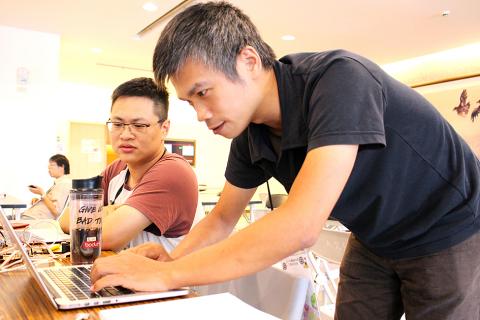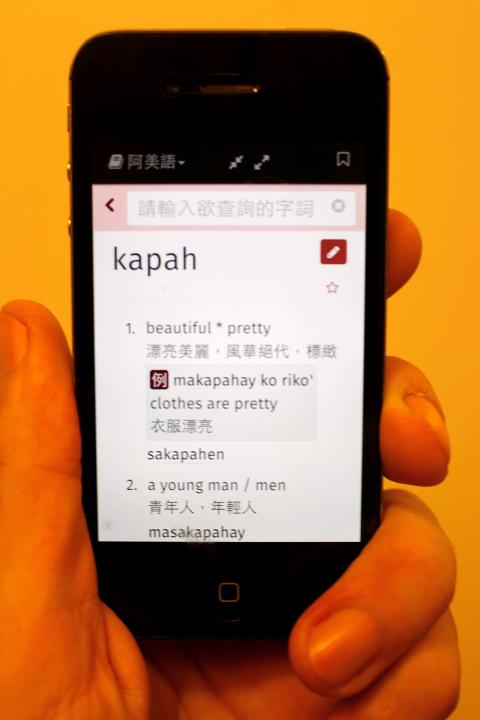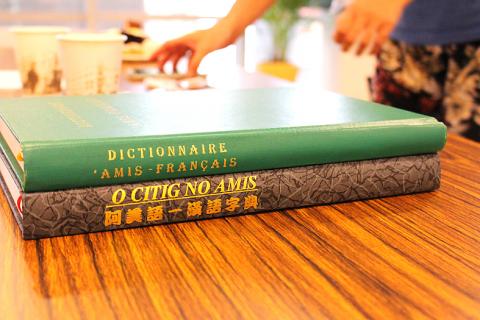A lack of online resources can make learning Taiwan’s Aboriginal languages incredibly difficult. But a new app called Moedict Amis dictionary (阿美語萌典—方敏英字典) has made learning the Amis language as easy as cecay, tosa, tolo (one, two, three).
A group of volunteers have come together to create the first ever Amis language dictionary app for mobile phones. The group includes both Amis and non-Amis, engineers and tech luddites — and even a former legislator and a Catholic priest.
The app’s development is not targeted at language enthusiasts but for the Amis to save their language from years of regressive government policies, and urban migration that has crippled the development of Aboriginal languages.

Photo: Aaron Wytze Wilson
“We’re not just looking to preserve the language for future generations, but also hoping to set off a cultural revival for other Aboriginal languages,” says group member Tsai Wei-ting (蔡維庭).
FACING EXTINCTION
According to a UNESCO report in 2009, Taiwan’s Aboriginal languages are in serious danger of extinction unless drastic action is taken to preserve them.

Photo: Aaron Wytze Wilson
Due to decades of regressive language policies under the Japanese and Chinese Nationalist Party (KMT) governments, people of Aboriginal background grew up and were educated in a language that is not originally their own.
Taiwan’s Amis are no exception. Although the government estimates the Amis population at a little over 200,000, the number of people who speak Amis as their first language is estimated to be lower than 10,000.
However, the exact number is not known because no government survey has been carried out to find it.

Photo: Aaron Wytze Wilson
With such a rapid decline in native-speaking Amis, immediate action is needed to prevent further decline. However, the government’s response has been slow because it doesn’t seem willing to acknowledge how dire the situation is.
ALINGATO, AMIS FOR THANK YOU
Just as the Amis language is facing a critical juncture in its preservation, a group of software engineers and concerned citizens have come together to create an Amis dictionary phone app.

Photo: Aaron Wytze Wilson
“We didn’t have too much interest from the Amis community at first, until Lafin Miku, who is Amis, stepped forward to help out with the project” says Miaoski Lin (林哲民), one of the app’s software programmers.
Lafin and Lin are part of the netizen collective g0v, a civic activist group that uses tech, new media and data to solve some of Taiwan’s biggest social and political problems.
Lafin has acted as a critical go-between for the group and the larger Amis community. “It’s a very meaningful project, but I was skeptical at first. Digitizing an entire dictionary is so tiring,” Lafin says.
Much of the Amis language is preserved in leather-bound dictionaries that are decades old, with very few of them making it online.
Converting them into digital content is an exhausting task, requiring weeks of monotonous scanning and data input.
To simplify the procedure, the group uses crowd-sourcing, a tactic that allows multiple group-members to work on the task of scanning and inputting at once.
The group has also been fortunate to have the help of two patron saints of the Amis language.
The first is former People First Party legislator Tsai Chung-han (蔡中涵), a respected member of the Amis community who has spent decades of his own time and money to compile an Amis-Chinese dictionary.
The second is 82-year-old father Maurice Poinsot, a French Catholic priest who moved to Taiwan when he was 21 years old to do missionary work in Hualien.
Poinsot compiled his French-Amis Dictionary along with now-deceased father Louis Pourrias.
Both Tsai and Poinsot have generously allowed the group to use the copyrights of their respective dictionaries free of charge.
“They are extremely supportive of our project,” said Tsai Wei-ting, “all they ask is that we show them the app when it’s finished.”
FUTURE DEVELOPMENTS
The group has made remarkable progress in the span of a year, with the first version of the app already online. They plan to add new features soon, including real voice pronunciation, dialect variations, and recordings of traditional Amis stories and legends.
The group hopes other Taiwanese Aborigines will feel empowered to start their own language dictionaries, and have made the programming code used to create the app available for anyone to use. “It’s important that Aborigines are not left out of the digital movement,” said Lafin.
The app is available now on both iOS and Android operating systems, and is free to download.

June 2 to June 8 Taiwan’s woodcutters believe that if they see even one speck of red in their cooked rice, no matter how small, an accident is going to happen. Peng Chin-tian (彭錦田) swears that this has proven to be true at every stop during his decades-long career in the logging industry. Along with mining, timber harvesting was once considered the most dangerous profession in Taiwan. Not only were mishaps common during all stages of processing, it was difficult to transport the injured to get medical treatment. Many died during the arduous journey. Peng recounts some of his accidents in

What does the Taiwan People’s Party (TPP) in the Huang Kuo-chang (黃國昌) era stand for? What sets it apart from their allies, the Chinese Nationalist Party (KMT)? With some shifts in tone and emphasis, the KMT’s stances have not changed significantly since the late 2000s and the era of former president Ma Ying-jeou (馬英九). The Democratic Progressive Party’s (DPP) current platform formed in the mid-2010s under the guidance of Tsai Ing-wen (蔡英文), and current President William Lai (賴清德) campaigned on continuity. Though their ideological stances may be a bit stale, they have the advantage of being broadly understood by the voters.

Artifacts found at archeological sites in France and Spain along the Bay of Biscay shoreline show that humans have been crafting tools from whale bones since more than 20,000 years ago, illustrating anew the resourcefulness of prehistoric people. The tools, primarily hunting implements such as projectile points, were fashioned from the bones of at least five species of large whales, the researchers said. Bones from sperm whales were the most abundant, followed by fin whales, gray whales, right or bowhead whales — two species indistinguishable with the analytical method used in the study — and blue whales. With seafaring capabilities by humans

In a high-rise office building in Taipei’s government district, the primary agency for maintaining links to Thailand’s 108 Yunnan villages — which are home to a population of around 200,000 descendants of the Chinese Nationalist Party (KMT) armies stranded in Thailand following the Chinese Civil War — is the Overseas Community Affairs Council (OCAC). Established in China in 1926, the OCAC was born of a mandate to support Chinese education, culture and economic development in far flung Chinese diaspora communities, which, especially in southeast Asia, had underwritten the military insurgencies against the Qing Dynasty that led to the founding of